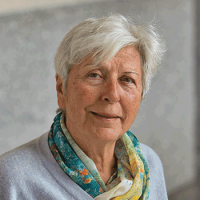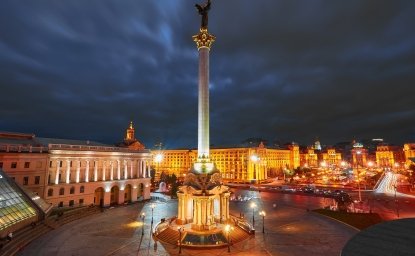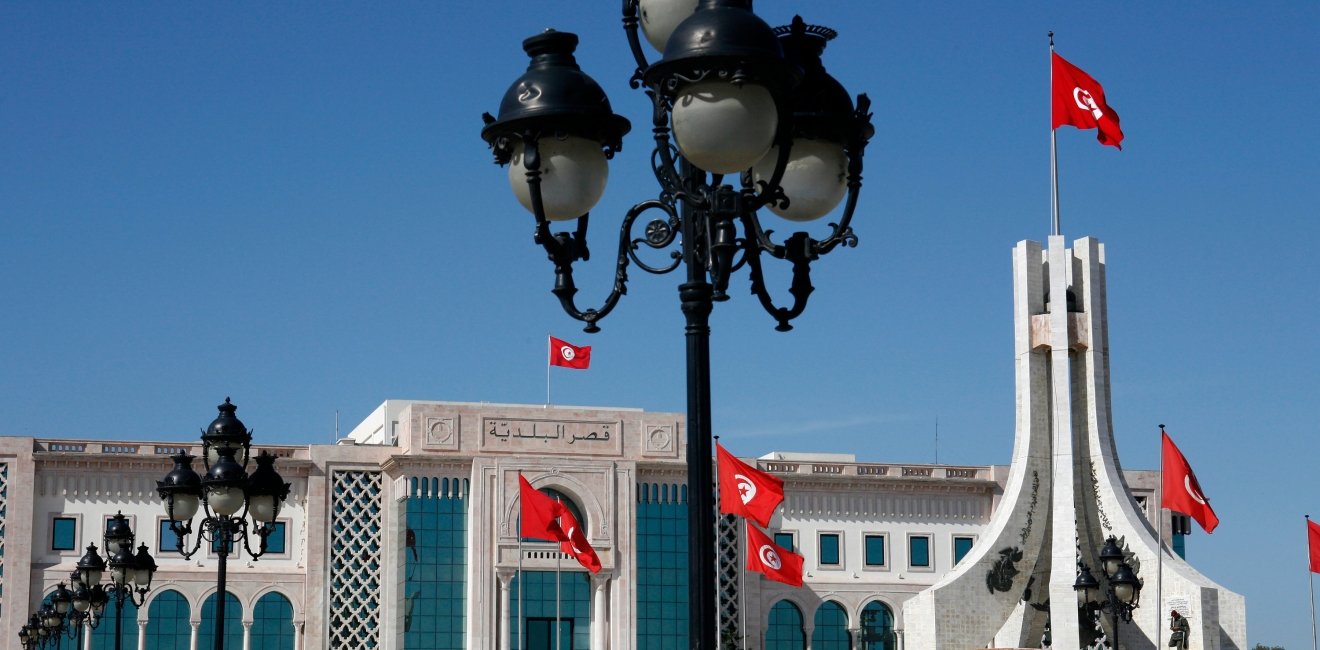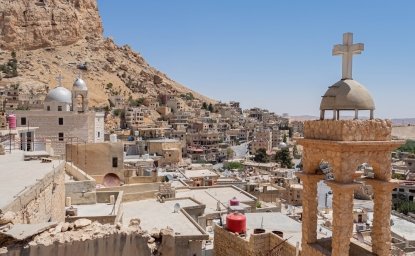The 2011 uprising marked the beginning of multiparty competition in Tunisia—the country had a de jure multiparty system since 1987, but the government party, the Rassemblement Constitutionnel Démocratique (RCD) dominated all elections, banning potential competitors like the Islamist Ennahda Party. The smaller parties that were allowed to function merely added a façade of democracy to a de facto single party regime. After the 2011 uprisings, new political parties developed quickly. A new party could be registered easily, and the lack of a minimum vote threshold in the proportional representation system encouraged endless proliferation. Dozens of parties now exist on paper and over twenty are seated in the 217-member National Assembly.
The number of parties is a threat to Tunisian democracy. Most parties are too small, ephemeral, and fragmented to represent the interests of their constituents effectively. Even Ennahda, once a well-organized party with a clear ideology, is facing a crisis of leadership and is torn between its president’s drive to rebrand it as a “Muslim Democratic Party” and its deep Islamist roots. Tunisians no longer believe that parties can provide solutions for the country’s problems and are again turning to the streets to seek redress of their grievances. The crisis of the parties is turning into a crisis of democracy.
The political system
The role of parties needs to be understood in the framework of the formal system created by the constitution. Tunisia has a parliamentary system, with a prime minister chosen by the parliament, but it also has a president elected by universal suffrage with considerable power over foreign policy and the military. Both presidents since 2014 have sought to increase their power to the detriment of the prime minister’s, with no success so far but creating tensions. The competition between the president and the prime minister threatens the power of the National Assembly, which elects the latter. The Assembly also elects its own speaker, as is the case in most countries, usually without causing problems. However, after the 2019 elections, the assembly elected as speaker Rached Ghannouchi, the head of Ennahda and one of the major political figures in the country, creating a third center of power, causing more tensions. The politics of Tunisia has become the politics of personalities, rather that institutions and parties.
In 2013, however, the parties lost their influence on the political process, ceding the initiative to civil society organizations, and they never fully re-established it.
Political parties played an important role at the beginning of the transition. They were essential to elections for the constituent assembly and in the formation of the troika, the three-party alliance that governed the country until 2013. Ennahda, which won the plurality of the votes in 2011, controlled the prime minister position, while the Congress for the Republic took the presidency and Ettakatol nominated the speaker of the Constituent Assembly. In 2013, however, the parties lost their influence on the political process, ceding the initiative to civil society organizations, and they never fully re-established it.
The Constituent Assembly was extremely slow in producing the new constitution and impatience mounted in the country. To make matters worse, the assassination in February 2013 of a prominent leftist politician, Chokri Belaid, undermined confidence in Ennahda, which was accused—wrongly, it turned out—of being behind the assassination. Prime Minister Hamadi Jebali argued that the Ennahda-led cabinet should step aside in favor of a broader one, but he was rebuffed and resigned from the party. He was succeeded for a few months by another Ennahda leader, Ali Laarayedh. This was the last time Ennahda controlled the government.
The rise and decline of party politics
With confidence in the elected Constituent Assembly and the parties at a low point, the initiative for solving the impasse passed to the civil society organizations in the Quartet for National Dialogue. The quartet included the labor federation (UGTT), the employers’ federation (UTICA), the Tunisian Human Rights League (LTDH) and the Lawyers’ Syndicate. UGTT, with its large membership and chapters all over the country, was the most important organization. The quartet was a self-appointed, non-representative organization, but the political parties were at a loss, so they acquiesced. The quartet demanded that Ennahda relinquish the premiership to which it was entitled by elections and accept instead the formation a “technocratic” government under the leadership of Mehdi Jomaa, an independent. This was the solution Hamadi Jebali had proposed earlier with no success, but this time Ennahda acquiesced. Under pressure from the quartet and the public, all parties in the Constituent Assembly also agreed to speed up the writing of the constitution, reaching the necessary compromises and approving the document in January 2014. The process avoided the breakdown of the transition, but the quartet had sidelined the parties.
Parties made a brief come back in the 2014 parliamentary and presidential elections with Ennahda and Nida Tounes dominating. Ennahda was by far the best organized political party in Tunisia but it came second to Nida Tounes, a broad inchoate organization founded by Beji Caid Essebsi, a veteran of the Bourguiba regime. Nida Tounes had neither ideology nor a real party structure. It was held together by Essebsi’s own reputation and political acumen and by the distrust of Ennahda on the part of many secular Tunisians.
After campaigning on an anti-Ennahda platform, Essebsi was thus forced to turn to his enemy Rached Ghannouchi and form a government of national unity.
Essebsi won the presidency in a run-off election against Moncef Marzouki, the president under the Troika—twenty candidates participated in the first round of the presidential voting, but Ennahda had decided not to enter that race. Nida Tounes also won the parliamentary elections, getting eighty-six seats to Ennahda’s sixty-nine. The remaining sixty-two seats were scattered among parties of widely different orientation and Nida Tounes failed to forge a broad enough alliance to form a government. After campaigning on an anti-Ennahda platform, Essebsi was thus forced to turn to his enemy Rached Ghannouchi and form a government of national unity.
The agreement was another blow to the political parties. The compromise was worked out not between organizations but between Essebsi and Ghannouchi, the two leaders to whom Tunisians often referred, not entirely kindly, as the two old men. For Ennahda, the compromise was one more in a series of concessions that Ghannouchi had forced the party to accept. In 2013, he had talked the party into accepting the resignation of Prime Minister Ali Laarayedh and his replacement by Mehdi Jomaa. He had also strong-armed the organization into enacting a constitution that did not mention sharia, Islamic law, as a source of legislation. As he explained repeatedly, including in a conversation with this writer, sharia is not a code of law, but thirteen centuries of interpretations by different schools of Islamic jurisprudence—a simple reference to sharia in the constitution, he argued, did not mean anything. He was technically correct, but it was nevertheless a wrenching concession for an Islamist party to make and there was much grumbling in the ranks. It is worth pointing out that almost all Arab constitutions, including the one written for Iraq under the American occupation, contain references to sharia. Equally controversial was Ghannouchi’s redefinition of Ennahda as a Muslim Democratic party, rather than an Islamist one. For Nida Tounes, the alliance with Ennahda was a rejection of its raison d’être.
The demise of Nida Tounes
The consequence of the formation of a government of national unity were immediate for Nida Tounes, which started splitting. So many officials and elected representatives deserted that Nida Tounes lost its plurality in the National Assembly, with its seats decreasing to fifty-eight, while Ennahda maintained all sixty-nine. In addition to the alliance with Ennahda, a major point of dissent in Nida Tounes was the future of the organization. Essebsi had to relinquish his role as head of the party when he was elected president and he appeared unlikely ever to resume it because he was old and frail, although his mental and political acumen were intact. (He eventually died in July 2019, before his presidential term expired). Essebsi attempted to name his son Hafedh to be the party executive director and presumably his successor in a controversial move that accelerated the exodus from the party. By the time of the 2019 elections, many analysts concluded that Nida Tounes was no longer a factor in Tunisian politics and indeed it only managed to win three seats.
Prime Ministers without parties
As Nida Tounes disintegrated and Ennahda refused to step up and claim the premiership, with Ghannouchi arguing that such step would be too controversial, the relevance of political parties continued to decline. The premiership under the government of national unity went to an independent, Habib Essid, since neither Nida Tounes nor Ennahda could claim the position. Essid limped on for less than two years, hampered by a stagnant economy, high unemployment rates, and a cabinet divided among representatives from Nida Tounes, Ennahda, Afek Tounes and the Free Patriotic Union—parties that did not share even a minimalist common program. As a result, the cabinet achieved little and in July 2016 lost a vote of no confidence.
He managed to push through some badly needed economic reforms, but that made him even more controversial, leading in 2018 to large street protests supported by the left against his “unjust” measures.
The same problem plagued the next prime minister, Youssef Chahed. He was a member of Nida Tounes, but the party was too divided to provide him with a solid base of support. He managed to push through some badly needed economic reforms, but that made him even more controversial, leading in 2018 to large street protests supported by the left against his “unjust” measures. While trying to keep his government together and maintain the support of the Assembly, Chahed was also nurturing his personal ambition of running for president. He abandoned the dying Nida Tounes and in January 2019 he launched a new party, Taya Tounes, to be his own tool. Despite all the controversy and the lack of economic progress, Chahed managed to keep his position and only stepped down, as required by law, after the 2019 parliamentary elections, having survived for three and half years, the longest of any prime minister since 2011.
The 2019 elections led to the rise of President Kais Saied, who had refused to join a political party or to form his own. A prominent jurist, he campaigned on his reputation for honesty and won with large support from the youth. The National Assembly elections also saw the parties’ further loss of influence, with seats divided among twenty-one parties, most of which had no sway. Ennahda gained the plurality of seats, but fewer than the previous election. It tried to claim the premiership, but the cabinet proposed by its nominee failed to win a vote of confidence. The president charged with the task another man who practically did not have a party. Elyes Fakhfakh was a member of Ettakatol, but that party, once an important component of the troika that governed under the Constituent Assembly, had dwindled into near oblivion, failing to gain even a single seat in 2019. Fakhfakh managed to form a government on February 27, 2020, but it was weak, deeply divided from the outset, and thus unable to tackle important problems. After a lackluster six months, the final straw that broke the government were corruption allegations against Fakhfakh—companies in which he had an interest had apparently won government contracts by underhanded means. On July 26, Ennahda withdrew its support and Fakhfakh submitted his resignation. The president, who had been trying to expand his power, chose Hichem Mechichi, who was close to him and did not belong to a party, to form the government. Mechichi succeeded, but by January 2021 he was forced to reshuffle his cabinet to retain the confidence of the National Assembly as the economic crisis further deepened because of the COVID-19 epidemics and tensions between him and the president mounted.
The decline of Ennahda
Ennahda, which remained the only true political party in Tunisia, with an organization and platform, was also in crisis by mid-2020. There had long been tensions between the more moderate, pragmatic wing centered around Rached Ghannouchi and the hardliners who had watched Ghannouchi’s compromises with dismay. Ghannouchi had succeeded in bringing most of them along for a surprisingly long time. But by 2020 the task became impossible, at a time when the party was also facing growing challenges from outside its ranks.
Ennahda had emerged from the 2019 elections weakened, although it retained the plurality of seats. Its candidate for the premiership had been unable to form a government. The party had succeeded in controlling the speakership of the National Assembly but Rached Ghannouchi, who insisted on assuming that role personally, proved extremely controversial. He was often at odds with the president and unable or unwilling to separate his role as speaker of the Assembly from that as leader of Ennahda. For example, in January 2020 he traveled to Turkey and met with President Recep Tayyip Erdogan, even though foreign policy was the domain of the president, not of the parliament and certainly not of its speaker acting alone. Furthermore, under Ghannouchi’s leadership, the National Assembly had sunk into chaos, with growing rifts among the parties, particularly Ennahda and the Free Destourian Party. With only 17 seats, the Free Destourian Party was the third largest in the fractured assembly and was led by a militantly secular conservative woman, Abir Moussi, who was emerging as Ennahda’s most vocal challenger.
On July 30, with the country already staggering after the resignation of the prime minister, several parties in the National Assembly introduced a motion of no confidence in the speaker, accusing him of making decisions on his own without consulting the assembly and of issuing his own statements on Tunisian foreign relations. The motion received only 97 of the 109 required votes and Ghannouchi maintained his position, but his authority was undermined in the Assembly and most importantly in Ennahda, where many believed that it was a time for a change of leadership.
He initially resisted, but as a sizable number of prominent Ennahda members resigned, Ghannouchi finally pledged in November to step down at the party congress.
Opposition was no longer limited to the radical wing of the party. A sizeable group of Ennahda officials and well-known personalities formed the so-called Group of One Hundred. Invoking Article 31 of Ennahda by-laws, which bar the party president from staying in power for more than two terms, the groups demanded that Ghannouchi step down from that role at the next party congress, expected to convene before the end of 2020. He initially resisted, but as a sizable number of prominent Ennahda members resigned, Ghannouchi finally pledged in November to step down at the party congress. The congress never convened, but in January 2021, Ghannouchi renewed his pledge not to run again—the impact of the pledge was considerably blunted by the announcement that the party congress would be postponed for two years.
The end of democracy?
On March 20, 2021 protesters once again gathered on the Avenue Bourguiba in downtown Tunis, where crowds had assembled since 2011 to show their dissatisfaction with the status quo, and above all, their disillusionment with the political process. They were demanding the disbanding of the National Assembly—a rejection of the democratic institutions introduced after the 2011 uprising—and of the political parties that had had transformed politics into a chaotic clash of ambitions and personalities without addressing Tunisia’s huge economic and social problems. It is unlikely the National Assembly will be disbanded, however. There are no mechanisms in the constitution that allow disbanding the elected parliament and the president is not willing, at least for now, to take the country back to the days of unchecked executive power. It is nevertheless a stark reminder of the failure of the democratic process in Tunisia so far, which has created institutions and parties that a growing number of Tunisians do not believe represent their interests.
The parties are undoubtedly a big part of the crisis. They do not fulfill the task of representing the interests of their constituents and do not command respect. They are at best tools for advancing the political career of their leaders. Public opinion polls conducted by the International Republican Institute in September-October 2020 showed that only twenty percent of Tunisians believed that political parties were effective in addressing the country’s challenges. By contrast, sixty-one percent believed civil society organizations were effective, and even the embattled national government scored forty-two percent.
Protest as a routine means for citizens to express grievances and demand redress denotes a failure of democracy.
The demonstrations of March 20 were the latest in a growing number of episodes in which Tunisians rejected the formal political process and turned to the streets. People are regularly protesting all over the country. It is impossible to know for sure how often people take to the streets in different parts of the country, and in what numbers, without carrying out detailed studies on the ground. But even the spotty coverage provided by national and international media, which is limited to the most important events, indicates a constant stream of protests both in the impoverished interior regions and in the cities along the coast, including Tunis.
Protest as a routine means for citizens to express grievances and demand redress denotes a failure of democracy. Tunisia has been more successful than any other Arab country since 2011 in establishing the formal institutions and processes of democracy. However, those institutions appear to be failing to address the problems and complaints of citizens, who are turning elsewhere to make their voices heard. The failure of political parties to provide the channel between citizens and government is at the center of this failure.
An urgent first step toward restoring some confidence in democracy would be to force a drastic reduction in the number of political parties by establishing a threshold for representation, as is the case in most parliamentary democracies. A threshold of five percent of votes cast would eliminate all but five of the political parties now represented in the National Assembly. Even a two percent threshold would eliminate all but eight parties. This would go a long way to exclude and eventually destroy parties that only exist to further the ambitions of their founders and to force the formation of alliances and coalitions around a platform. It may not be enough, but it would be a step toward restoring faith in parties and in the democratic process. However, it may take more pressure from the street and perhaps a new quartet to return to a functioning democratic system.
The views expressed in these articles are those of the authors and do not reflect an official position of the Wilson Center.
Author

Former Senior Research Associate and Head of the Middle East Program, Carnegie Endowment for International Peace

Middle East Program
The Wilson Center’s Middle East Program serves as a crucial resource for the policymaking community and beyond, providing analyses and research that helps inform US foreign policymaking, stimulates public debate, and expands knowledge about issues in the wider Middle East and North Africa (MENA) region. Read more

Explore More
Browse Insights & Analysis
Mark Carney to Lead Canada Amid Rising Trade Tensions With US



